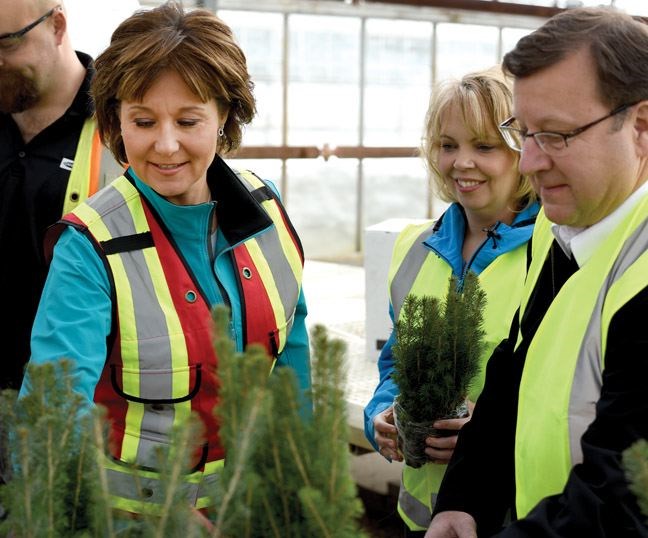Premier Christy Clark announced a $150 million investment in silviculture Friday in Prince George.
She added that it was part of the government's 10-year commitment to put $800 million into forest replanting efforts.
"The new forests will reduce greenhouse gas emissions like carbon dioxide, and we are also going to seek innovative solutions to help us meet our climate goals at the same time," said Clark, speaking at the J.D. Little Forest Centre owned by Canfor. "But let's never forget that the most basic solution is Mother Nature's solution, and that is sequestering carbon in our forests. Planting more trees is good for fighting climate change...I think of that as $800-million invested in climate change. But also, just as importantly, it's $800-million invested in working people in British Columbia to make sure they have a job to go to every day and money to look after the people they love. In that time, these programs are going to create 20,000 jobs - most of them in rural and northern communities - and it will represent a reduction in 11.7 megatonnes of greehouse gasses."
The context she gave for that was the equivalent of all the cars, trucks, planes and motorcycles in Canada.
"It's a very significant contribution we will be making to the country's agenda to fight climate change," she said. "We have become a world leader in balancing economic growth with job creation and with environmental protection."
The NDP's spokesperson for forestry issues, veteran Lower Mainland MLA Harry Bains, was quick to call the announcement an act of blatant electioneering.
"I think its a desperate attempt by this government to convince the people of this province - especially forestry-dependent communities - that they care about their well-being. But for the past 15 years they have been asleep at the switch."
He listed mill closures and shrinking workforces in the lumber industry as signs of mismanagement. He also pointed to the auditor general's view that there is no proper inventory of the B.C. forest land base, so how, said Bains, could a provincial silviculture program even be contemplated.
Bains also scoffed at the mention of this investment being positive for climate change.
"Every time you have a healthy forest, you have done something good for the climate. That's not new," he said. "But they have created such a dire need in the forest for reforestation, and she's trying to take credit, now, for neglect of the forests. When you harvest trees, you're always supposed to replant them, but they haven't been doing that."
The province's Minister of Forests, Steve Thomson, said that reforestation programs had been ongoing with the harvesting programs. Part of the predicament the industry faced in the first place was the need to rush large harvests of dead trees killed by the mountain pine beetle, and now that that rush is over, there had to be a contraction of the harvesting and milling operations across the large affected regions.
"Since 2005, we've invested over $445 million in reforestation through Forests For Tomorrow," said Thomson. "Today's funding will build on those efforts and ensure our children can enjoy the environmental and economic benefits we enjoy from our forests."
Several forest industry stakeholders applauded the announcement made in Prince George on Friday. One such comment was by John Betts, executive director of the Western Forestry Contractors' Association who said, "This firm funding is good news for the forestry contracting sector, in that it will create meaningful and ongoing employment for our members. This investment creates certainty for the small business owners that comprise our sector and, of course, this investment is also good news for our forests - especially those in the interior that have been damaged by the mountain pine beetle."
The $150 million will be transferred in the 2016-17 fiscal year as a lump-sum payment to the independent Forest Enhancement Society of British Columbia, a group dedicated to the advancement of environmental stewardship. This is in addition to the $85-million government allocated in 2015-16 to the society.



.png;w=120;h=80;mode=crop)